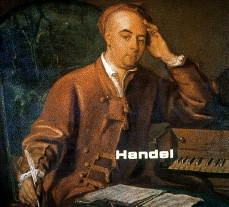|
Makers
Violin History & Timeline
PERFORMERS
Violin
Viola
Cello
Bass
Gamba, etc.
The Roots of Famous Violinists
TEACHERS
Violin
Viola
Cello
Bass
DEALERS
Listings
Specialist
Event
LUTHERIE
Bibliography
Listings
Gallery
COLLECTING
Identification
Buying
Selling
THE INSTRUMENTS
Violin
Viola
Cello
Bass
Viol
Bows
Tales
LINKS
Interesting Sites
GALLERY
Antique Instruments
Historical Photos
|
|
 George
Frideric Handel was a great musician and a strong human being whose
commitment to music withstood the rise and fall of his popularity. Born
in Halle, Germany on February 23, 1685,
Handel received little encouragement to
pursue his interest in music. His father was a surgeon who felt that the
appreciation of music was a sign of weakness. Nonetheless, with his
motherís assistance, Handel learned how to play the organ, and
eventually won his fatherís consent to study music. George
Frideric Handel was a great musician and a strong human being whose
commitment to music withstood the rise and fall of his popularity. Born
in Halle, Germany on February 23, 1685,
Handel received little encouragement to
pursue his interest in music. His father was a surgeon who felt that the
appreciation of music was a sign of weakness. Nonetheless, with his
motherís assistance, Handel learned how to play the organ, and
eventually won his fatherís consent to study music.
Handel studied under Zachau, the organist of the
Lutheran Church at Halle, and quickly became a stunning instrumentalist.
After three years of training, Zachau felt that he had nothing more to
teach Handel. Later, Handel performed as the assistant organist at the
Halle Cathedral, and wrote compositions that were performed at church
services. In accordance with his fatherís will, Handel began the study
of law. However, within a year he was offered the position of organist
at the Cathedral of Moritzburg . At merely the age of eighteen,
such an offer was a great honor, and Handel happily accepted it.
In 1703 Handel resigned from his post, and pursued
greater musical opportunities in Hamburg, the center of German opera at
the time. Handel was employed as a violinist- composer in the opera
house, and he composed his first operas, Almira and Nero, which
met with great success. Handelís accomplishments incited the envy of
competing composers, and Hamburg quickly became an unpleasant
environment for Handel. In 1706 he departed for Italy where he composed
his first oratorios, and was acclaimed by the royals. Handel carved out
an internationally respected name for himself before returning to
Germany at the age of twenty five.
Eventually, Handel settled in England. His initial
compositions followed the norms of Italian operas. Yet, his later pieces
took on a style of their own. Following a stroke and the failure of some
operas, Handel developed a unique mode of composition, the oratorio. He
is best known for his oratorios, choral dramas that emphasize arias and
recitations. His use of choruses and religious sentiment in these pieces
evolved into a new form of musical entertainment. Similar to operas,
however, devoid of scenery, the oratorio
became a genre of its own. Handelís famous oratorio, Messiah,
received tremendous attention prior to
its opening day, and was much awaited. Tickets sold for atrocious
amounts, and music lovers publicized it constantly. Unfortunately, it
was unsuccessful as audiences could not acclimate themselves to Handelís
use of prose instead of a poetic text. Nonetheless, Handel was a unique
musician who did not limit his life work to operas and oratorios. He
wrote anthems, psalms, and chamber music as well.
Handel endured changes in his public standing
repeatedly throughout his musical career. Sadly, toward the close of his
life he suffered from paralytic strokes and cataracts which left him
blind. Despite his inability to see, Handel continued to perform and
conduct. He was an inspiration to other composers and musicians, and
died shortly after conducting a successful performance of Messiah. Beethoven
revered Handelís strength and creativity and stated, ďHandel is the
greatest composer who ever lived. I would bare my head and kneel at his
graveĒ (1824).
Notes by Shanaira Udwadia (May-2001) |